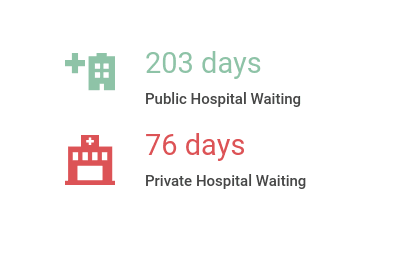Compare health insurance with colonoscopy cover
All prices are based on a single individual with less than $101,000 income and living in Sydney.
Key takeaways
- A colonoscopy examines the large bowel. The procedure is covered by Medicare, but you will not be able to choose your own doctor.
- If you do not have Medicare and are uninsured, a colonoscopy would cost over $2,000.
- Demand for colonoscopies is very high - around 7 months in the public system.
When might you have a colonoscopy?
A colonoscopy is a medical procedure that examines the large bowel. It's the most accurate test for cancer of the colon and rectum. Growths can develop on the lining of the colon and sometimes become cancerous.
Colon or bowel cancer screening usually begins at the age of 50 for most people. If a colonoscopy doesn't find anything abnormal, you shouldn't need a test for another ten years.
It is not just a requirement when you reach a certain age. You may also need a colonoscopy if you have any of the following symptoms:
- Bleeding from your rectum.
- Blood in your stool.
- Pus or mucus in your stool.
- Unexplained abdominal pain.
- Unusual changes in your bowel habits.
- Your family have a history of colon cancer.
- You have Crohn's disease.
Cost of a colonoscopy
If you are unregistered or uninsured, a colonoscopy could cost over $2,000. It's a procedure you will have at some point in your life, so it's worth considering whether you'd like to have it done privately or through the public system.
How does Medicare cover colonoscopies?
As a public patient in a public hospital or clinic, you'll generally have little to no out of pocket expenses for treatment, as the procedure is covered by Medicare. Unlike the private system, you will be assigned a specialist for the procedure; you won't be able to choose your own doctor.
You will also go on a waiting list for a colonoscopy. Demand for colonoscopies is very high. The average public waiting time is just under 7 months, far longer than the recommended 30 days for those who need it. Indeed, Bowel Cancer Australia says that less than 20% of us who require a colonoscopy aren't getting it within the recommended 30 days. If you need a colonoscopy urgently, or you want to receive treatment quicker, you could opt to go private for shorter waiting times.
Average public vs private wait times in Australia for colonoscopies

Source: Australian Institute of Health and Welfare (AIHW) Private health insurance use in Australian hospitals 2006–07 to 2016–17
How does private health insurance cover colonoscopies?
One of the perks of being a private patient is greater freedom of choice. You'll be able to select your own doctor, when you want the colonoscopy and book in for any prior consultations to discuss the procedure.
While this isn't necessary for everyone, if you have certain health issues like Crohn's disease or bowel cancer, it's likely to give you greater peace of mind knowing you can choose someone you trust.
Similarly, if you've been living with your condition for some time, or simply want a shorter waiting time, you can choose your own specialist.
With a colonoscopy, your private health insurance policy generally covers most of the cost of your procedure, though you are likely to face a small out of pocket expense, depending on your excess, overnight fee, doctor and hospital price. Most basic policies cover colonoscopies for around $70 a month.
Here are some of the ways you can work out a price estimate:
- Call your doctor or specialist to get a price.
- Ask if your doctor is in your private health insurance provider's preferred list.
- Ask for an extras cost.
- Make sure there are no hidden out of pocket expenses.
- Ask for a Medicare code.
- Call your private health insurance provider and give them your Medicare code.
- Find out your doctor's estimated rebate.
Finder survey: How many people think hospital insurance is worth it?
| Response | Female | Male |
|---|---|---|
| Somewhat | 38.89% | 37.71% |
| Yes | 34.67% | 34.79% |
| No | 26.44% | 27.5% |
Frequently asked questions
Sources
More guides on Finder
-
How does health insurance cover brain surgery?
Compare public and private health insurance for brain treatment.
-
Gold health insurance
Gold hospital insurance is the most comprehensive hospital cover that money can buy – starting from around $41 per week.
-
Silver health insurance
Guide to what is covered by silver tier hospital policies.
-
Health insurance tiers
Find out what health insurance tiers mean and how much you’ll pay.
-
Health insurance for home care
What is home care, is it included in Medicare and is any cover provided by private health insurance? Find out here.
-
Health insurance for drug and alcohol addiction
Addiction to drugs and alcohol is a growing problem in Australia and this guide looks at the financial assistance available to addicts seeking treatment and the role played by both the public and the private healthcare systems.
-
Inpatient and outpatient services
Find out if being treated as an inpatient or an outpatient will affect your private health insurance cover.
-
Health insurance for weight loss surgery
Health insurance for weight loss surgery comes with a 12-month waiting period, so it's worth getting sooner rather than later.
-
Basic hospital cover
Read our guide to see what is covered by Basic hospital policies in Australia.
-
Health insurance for insulin pumps
Insulin pumps are covered under all gold hospital policies, as well as on some Silver Plus policies. The details do differ between funds, however.
